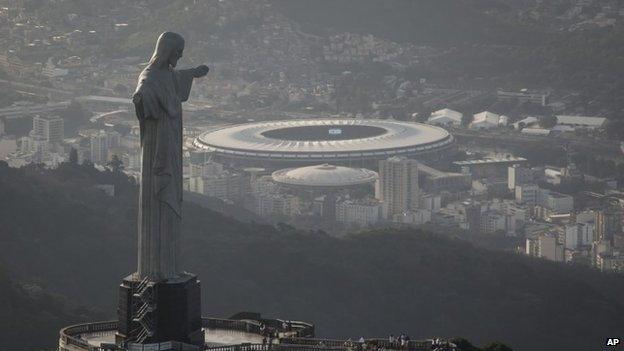Goldman's World Cup forecast
- Published
- comments

Goldman Sachs has built a statistical model to predict which nation will win the World Cup
There is a weird affinity between economists and the beautiful game.
Keynes was a balletomane, but most British economists - certainly of the male variety - are football fanatics (and it's not only the boys; my brainy former colleague Stephanie Flanders, now of JP Morgan, was shouting QPR back into the Premier League at Wembley last weekend).
So with the World Cup just weeks away, the big question is whether the economists are any better at forecasting football results than their pretty ropey performance in respect of growth, inflation and catastrophic financial crises (ahem).
Historic data
Well every four years, the plucky boffins at Goldman Sachs gamely have a go at predicting who will win the biggest tournament in the world.
And they do this using a pretty complicated statistical model that predicts the result of each match "based on a regression analysis that uses the entire history of mandatory international football matches - ie no friendlies - since 1960".
This generates 1400 observations, fed into a forecasting model that assumes "that the number of goals scored by a particular side in a particular match follows a Poisson distribution".
Or to put it another way, Goldman's forecast is all based on historic data and mathematical formulae, with no room at all for human judgement (although it does weight probable outcomes by whether a team is playing in its home country, or on its home continent, and by numbers of goals scored and conceded in recent games).
Now if this reminds you of the financial models used by banks like Goldman to assess the risks they were running before the great Crash - whose calamitous under-stating of risk contributed directly to that Crash - you would not be far wrong.
And here is what may worry you. Those flawed risk-control models only mullered the global economy.
Home advantage
But Goldman's latest forecasting foray is about something much more important: association football.
So what are Goldman's predictions?
Well it sees Brazil, Argentina, Germany and Spain as the four semi-finalists.
And it calculates a 48.5% chance of Brazil lifting the cup, with a 14.1% chance of Argentina being victorious.
For what it is worth, the implied probabilities of Brazil and Argentina winning built into Ladbrokes' betting odds are lower.
So if you rate Goldman as a footie predictor (not to be confused with its skills in FTSE prediction - ha ha) then there is what you might call a trading opportunity here.
What is Goldman's assessment of England emerging with the trophy? Well, a meagre 1.4%
But before you seek comfort for our lamentable prospects in a traditional pie binge, note that Goldman rates England's prospects as better than Uruguay, Portugal, France and in-form Belgium (my tip as a long-shot punt).
Which probably goes to show that computer models and algorithms are all very useful and all that.
But when it comes to assessing the probable outcome of football matches, they are probably inferior to a beery shouty debate in the local hostelry.